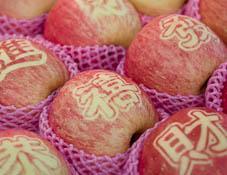
Several factors have conspired to dampen trade of fresh fruit in the run up to this year’s Moon Festival celebrations, continuing a downward trend in sales over the holiday period in China and Taiwan.
The cause for the downturn in sales has been levelled largely at the festival falling earlier than it has in recent years. Scheduled to take place on the 15th day of the eighth month of the Chinese calendar, the Moon Festival this year fell on 22 September.
Because of this earlier date, some importers have reported difficulty sourcing popular items. “It’s earlier than last year and there is less fruit around,” said Raymond Jin of major Chinese fruit trader and distributor Golden Wing Mau.
Supplies of US grapes and apples, which are popular for gifting during the festival, have been hard to source, he added. “Compared to last year and 2008, the volume has been much lower.”
While supply of some key items was limited, what the product importers were able to find sold at good prices, he told Fruitnet.com.
Tony Lin of Hong Kong-based importer One Trade said that while fruit from the Southern Hemisphere was more readily available, South African citrus proved an exception.
“South African oranges were popular and the Midknight variety was making a killing early in the season, and Cara Cara was also doing very well,” he said. “But we’ve not been able to import from a lot of our growers because the quality was not right. The colour was not there, or the brix levels were not right to export.”
Lantao’s John Wang agreed that this year’s sales were slow, estimating that demand for fruit across the board was down by around 10-15 per cent on previous years.
He attributed the decline to a few key factors. “The economy has slowed down a little and this year the Moon Festival falls so close to the Chinese National Holiday people are preparing for the long holiday and for travel,” he commented. “Also, some of the good US grape production was delayed for a few weeks.”
Another key dampener on import sales was the abundant supply of domestic fruits characterised by good quality, with grapes a case in point, according to Mr Wang. “Early US Red Globe did not move as well as last year, as more good-quality domestic Red Globe came online this year,” he noted.
Lionel Liang of Zhxing RunFeng Food agreed sales of domestically-grown produce were good, with an estimated increase in sales of 20 per cent during the festival period. He said part of the problem sourcing imported fruit for the festival had come from an increased demand from markets in other areas such as the EU and the Middle East.
Cherries, mainly from the Pacific Northwest and British Columbia, were one product to buck the trend of slower sales, according to Mr Wang. “Cherries were one of the best movers this season,” he noted. “More and more people want to try them, and there was a shortage.”
Meanwhile, in neighbouring Taiwan, the Moon Festival brought no more cheer to the trade, and importers reported a downturn in sales compared with previous years.
Norman Tarng of major import company Coverings International attributed the drop to a lack of typhoon activity in Taiwan earlier in the year, which left domestic fruit supplies largely in tact. Although Typhoon Fanapi caused extensive damage to crops in the south of the country just a few days before the festival, he said most crops had already been picked and packed by then.
“Typhoons are the biggest variable with importing fruit. Most years we have one or two typhoons in July and August, which affect fruit supply. This year the typhoon was late and as a result 90 per cent of fruit has come from local farmers,” he commented.



